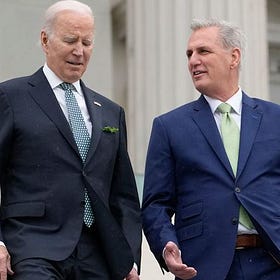The Government Should Do Things
Isn't it strange that no one is fixing common, solvable problems?
If you opened this post on your phone, there’s a good chance you’ll be interrupted by a spam call while you’re reading.1
The experience is near-universal. An incoming call from a number that looks conspicuously like your own, perhaps off by only a digit or two. If you answer, you may learn that your car warranty is about to expire, or find a robotic voice speaking Mandarin, or hear nothing at all. If you ignore it, you’ll likely get a voicemail promising important information about your student loans or offering protection from the incipient IRS investigation into your back taxes. I find the frequency ebbs and flows, from once every couple days in a slow month to what feels like every hour for a week at a time. And that’s not counting a clear increasing in phishing texts and the persistent inquiries from shady real-estate companies offering me cash for a property I do not own.
There are many reasons why “phone” has become an increasingly inaccurate descriptor for how we use the device we keep in our pockets: the ever-escalating capabilities of mobile apps, young people’s much-bemoaned anxiety about making calls, the fact that synchronous audio communication has been outclassed not just by the convenience of texting but also by the more-personal touch of video calls. But surely the proliferation of robocalling is a huge factor. I am a reasonably social person who makes a concerted effort to stay in touch with friends and family, and easily 80 percent of the calls I’ve received in the last month have been “Potential Spam.” Here in your pocket is a magical device with which you can hear someone’s voice in an instant from anywhere in the world, yet we’ve been conditioned to assume that its vibration heralds not a loved one making a connection but a cable company you don’t subscribe to warning about an urgent alert on your nonexistent account.
Regulating spam calls is the domain of the Federal Communications Commission. I understand that the FCC is trying to fight them. I am not an expert on the technical or legal side of this process, and I’m sure it’s easier said than done. I am even prepared to accept that Trump-era FCC Chairman Ajit Pai was more of a symbol of the proliferation of robocalling than the cause of it, so fixing it is not as easy as reversing his initiatives. On the other hand, I cannot fathom that there isn’t more the agency could be doing if they were given a clearer mandate and more resources to solve a problem that annoys hundreds of millions of Americans and purportedly costs them tens of billions of dollars per year. Consider how many electoral votes a candidate who promised to end spam calls would win. How is it possible that no politician on either side of the aisle seems to care about doing it?
In modern American politics, the term “problem solver” usually means a centrist. (Your mileage may vary on how much such moderates actually transcend partisan gaps and enable good governance as opposed to advancing their own technocratic political project under the guise of pragmatism.) That promises to get things done in Washington now come with ideological implications is unfortunate, as it obscures the fact that a government is supposed to proactively address issues in its citizens’ lives as they arise. Our leaders clearly understand that their purview comprises lower-stakes corporate malfeasance in addition to polarizing global issues, as they occasionally take time out of their busy schedule of allowing climate change to continue unabated and shrugging their shoulders while an unelected anti-majoritarian judiciary writes policy for the nation to investigate blatant bad actors like Ticketmaster. So why does it happen so infrequently as to be surprising?
To put it another way: At first blush the Federal Trade Commission looking into why McDonald’s ice cream machines are always broken sounds like a case of misplaced priorities. But isn’t it a sign of a healthy administrative state if the government has the bandwidth to address the little ways that corporate greed makes people’s lives worse?
Courting Disaster
The Supreme Court closed its 2023 session last week with a climactic fury of conservative rulings. In Biden v. Nebraska, the Court struck down the Biden administration’s long-promised plan to cancel (some) higher-education student debt. 303 Creative LLC v. Elenis
As obnoxious and even harmful as spam calls are, at least they are not as dangerous as self-driving cars. It should be self-evident that a machine weighing multiple tons and capable of reaching fatal speeds is a potential liability to not merely the driver and passengers who may not fully understand the limits of the technology’s reliability, but also to the motorists, cyclists, and pedestrians on the road who did not consent to being lab rats in an AI experiment. Why, after the first confirmed death of a human navigator in a crash caused by a self-driving car, or the first time such a vehicle killed a pedestrian, was there not an organized political movement to crack down on autonomous road vehicles? Establishing strict nationwide safety standards and setting harsh penalties for both users and manufacturers for incidents caused by self-driving cars would not have been a radical position. It would have been the moderate course, compared to banning them altogether until they are proven to be road-ready.
Earlier this year, we rented a Tesla for a weekend when we arrived at the airport counter and they were out of cars that don’t spontaneously combust with conspicuous frequency. We didn’t dare use the (in)famous Tesla Autopilot self-driving feature. But we got a sense of its reliability from the car’s driver-assistance screen, which was displayed even with us controlling the wheel. The system identified lane markers and roadside objects with what I would ballpark around 97% accuracy. In terms of human advancement, that’s a remarkable feat! But from a safety standpoint, would you feel comfortable letting an algorithm drive a car if the probability of it mistaking a pedestrian for a traffic cone are higher than the odds of rolling snake eyes? Isn’t it weird that the Secretary of Transportation’s response to a spate of literal Tesla-driven fatalities was not a call to action but a discussion of semantics and fine print? (At least until you remember who he is.)
Not that it’s hard to see the appeal of self-piloting cars when driving itself feels increasingly perilous. If you’ve driven at night at any point in the last couple years, surely you have noticed that other cars’ headlights have gotten brighter. It didn’t used to be that you had to squint every time a car approached from the opposite direction on a two-lane road. Even worse is when (what I once thought of as) high-beam-strength headlights are behind you, bathing your car in its glare. A couple weeks ago, on my way home from a concert, I got stuck in front of a car whose headlights were so bright that I had to drive with my elbow blocking the side mirror to be able to see the road. The problem is so glaring (pun intended) that academics have started studying it. Why isn’t any governmental body interested in doing something about it?2
The Wart of the Deal
The core message of Donald Trump’s first Presidential campaign was that he could get stuff done. Sure, he eventually stumbled into a vague ideological amalgamation of xenophobia, protectionism, and disingenuous support for the social safety net and cleaning up corruption. But the central argument for his candidacy was that he could make
Part of the problem is that cars are getting taller, so the headlights are more likely to shine into smaller vehicles — creating a perverse incentive where the best way to avoid external glare is to buy a huge car of your own. Taller cars also have significantly diminished visibility directly in front of the vehicle, making it harder to see pedestrians and other objects in their immediate paths. The numbers bear out that bigger vehicles are deadlier for pedestrians. Establishing some sort of safety standards for passenger-vehicle visibility seems like an absolute no-brainer, yet it has no political potency. A Senate bill in response to this problem, the STOP Frontovers Act, was introduced last year but went nowhere.
It’s no mystery why these issues are not priorities. The Earth is literally burning. Millions of Americans and billions of world denizens struggle to make ends meet. Myriad marginalized groups are under attack. These issues are far more important than headlight brightness. Even if concerted movements to regulate such small-scale problems materialized, surely they would face corporate lobbying in opposition. And in these days of intense negative polarization, even ideas that seem apolitical might take on an ideological bent. If the Biden Administration moved to curtail spam calls, would Marjorie Taylor Greene take to the House floor to insist that it’s her God-given right to fall for a telemarketing scam?
Still, these societal issues hinder, damage, and even destroy human lives every day. In a time when Democrats reflexively deflect critique as naïve and poorly prioritized, and Republicans see any evidence of their fallibility as a woke deep-state conspiracy, it’s worth enumerating and reflecting on the many obvious ways that our leaders could make our lives less-annoying and -dangerous, yet choose not to. Corny as it is to view politics through the lens of pop culture, the world would be a better place if our representatives adhered to Spider-Man’s credo: “With great power comes great responsibility.” That solving problems has become a centrist euphemism instead of a basic expectation of government is a damning state of affairs.
We owe it to ourselves and each other to judge our leaders not by what we like to think they believe but by what they actually do — and, just as importantly, by what they don’t. Democracy is like a Tesla: It’s reckless to let it run on autopilot.
This was intended as a joke, but then I got one while I was writing the next paragraph.
The recent legalization of adaptive driving beam headlights will hopefully reduce the proliferation of too-bright LEDs on the road, but it remains a matter of consumer choice.




